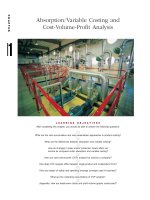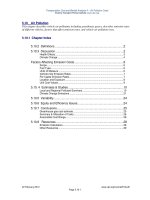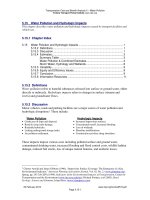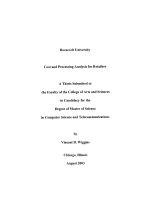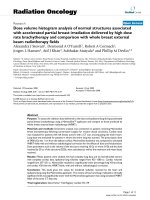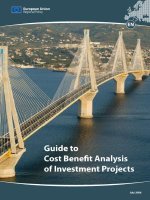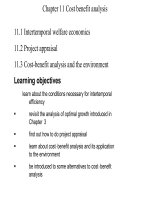Lecture no28 cost volume profit analysis
Bạn đang xem bản rút gọn của tài liệu. Xem và tải ngay bản đầy đủ của tài liệu tại đây (455.02 KB, 17 trang )
Cost-Volume-Profit Analysis
Lecture No. 28
Chapter 8
Contemporary Engineering Economics
Copyright © 2016
Contemporary Engineering Economics, 6 th edition
Park
Copyright © 2016 by Pearson Education, Inc.
All Rights Reserved
Illustration of Full Cost Concept
Contemporary Engineering Economics, 6 th edition
Park
Copyright © 2016 by Pearson Education, Inc.
All Rights Reserved
Cost-Volume-Profit Analysis
• Profit Maximization for a Short-Run Period
Profit function
Total revenue (TR) and total cost (TC) Functions
Profit Function
Optimum activity level
Contemporary Engineering Economics, 6 th edition
Park
Copyright © 2016 by Pearson Education, Inc.
All Rights Reserved
Cost-Volume-Profit Curve (unit: 1,000)
Contemporary Engineering Economics, 6 th edition
Park
Copyright © 2016 by Pearson Education, Inc.
All Rights Reserved
Contribution Margin and Break-Even Sales
Profit Function
Break-Even Volume (units)
marginal contribution
Break-Even Sales ($)
marginal contribution rate
Contemporary Engineering Economics, 6 th edition
Park
Copyright © 2016 by Pearson Education, Inc.
All Rights Reserved
Break-Even Chart
$600
Point of Desired Profit
Dollars
(in thousands)
500
Desired
Profit
400
300
200
100
on)
ti
a
i
rec
Total Cost Line
Cash Cost Line
(Dep
)
d
e
a
pens
ION Overhe pense
x
T
E
A
s
I
s Ex
REC ring
dmin
DEPnufactu d Admin ng and A Overhead
,
a
n
li
d M elling a iable Sel iable Mfg.
r
e
x
i
S
(F
ar
t Labo
ar
c
d
V
V
e
e
r
i
x
i
D
F
Direct Material
10
18 20 30 40 50 60
Units of Product (in thousands)
Contemporary Engineering Economics, 6 th edition
Park
Copyright © 2016 by Pearson Education, Inc.
All Rights Reserved
Useful Break-Even Sales Formulas
Break-Even Formulas
WSales at break-even point for total cost:
QA
Fixed costs
F
Marginal Contribution Rate MCR
($)
WSales at break-even point for cash costs:
Fixed cost - Depreciation
QB
MCR
WSales required for desired pre-tax profit level:
Fixed costs + Desired Profit
QC
MCR
Contemporary Engineering Economics, 6 th edition
Park
0
QB
QA
QC
Sales Volume
F
Copyright © 2016 by Pearson Education, Inc.
All Rights Reserved
Example: Cost Data for Break-Even Chart
Unit Variable Costs
Direct Materials
$2.00
Direct Labor
1.00
Variable Manufacturing Overhead
1.00
Variable Selling and Administrative Expenses
1.00
Total Unit Variable Cost
$5.00
o Fixed manufacturing overhead (including depreciation
of $10,000) = $70,000
o Fixed selling and administrative expenses = $30,000
o Selling price/unit = $10
o Desired profit before taxes = $100,000
Contemporary Engineering Economics, 6 th edition
Park
Copyright © 2016 by Pearson Education, Inc.
All Rights Reserved
Profit-Volume Graph
$200
PROFITS
($000s)
Point of Desired Profit
fi
Pro
Slope of profit line is
the marginal contribution
$100
0
$100
$200
$300
$400
$500
n
t Li
e
$600
$100
LOSSES
($000s)
Fixed cost
$200
10 20 30 40 50 60
UNITS OF PRODUCT (000s)
Contemporary Engineering Economics, 6 th edition
Park
Copyright © 2016 by Pearson Education, Inc.
All Rights Reserved
Effect of Variable Costs on Sales
The profit/volume graph shows profits (losses) at
different operating levels for the three companies.
Contemporary Engineering Economics, 6 th edition
Park
Copyright © 2016 by Pearson Education, Inc.
All Rights Reserved
Effect of Fixed Costs
•Financial Data
oSelling price per unit = $6.00
oVariable cost per unit = $3.00
oUnit marginal contribution = $3.00
oCurrent fixed costs = $600,000
oDesired profit level = $150,000
oRequired sales units = (600,000 +
150,000)/3 = 250,000 units
oFixed costs increase = $60,000
(ex. additional advertising expenditure)
oRequired sales units to maintain profits
= 810,000/3 = 270,000 units
Contemporary Engineering Economics, 6 th edition
Park
Copyright © 2016 by Pearson Education, Inc.
All Rights Reserved
Price Reduction and Increase in Variable Costs
Contemporary Engineering Economics, 6 th edition
Park
Copyright © 2016 by Pearson Education, Inc.
All Rights Reserved
Example 8.4: Break-Even Analysis
Given: Current Manufacturing Operation
A single shift five-day work week
o
o
o
o
Reached its maximum production capacity at 24,000 units per week
Fixed cost: $90,000 per week
Avg. variable cost: $30 per unit
Need to produce 4,000 additional units
At Issue: Add overtime (or Saturday operations) or
second-shift operation
o
o
Option 1: Adding overtime or Saturday operations: 36Q
Option 2: Second-shift operation: $13,000 + 31.50Q
Find: Which option?
Contemporary Engineering Economics, 6 th edition
Park
Copyright © 2016 by Pearson Education, Inc.
All Rights Reserved
Solution
Break-even
volume
36Q = $13,000 + 31.50Q
Q = 3,000 units
Decision
If Q ≤ 3,000, select Option 1.
If Q ≥ 3,000, select Option 2.
Contemporary Engineering Economics, 6 th edition
Park
Copyright © 2016 by Pearson Education, Inc.
All Rights Reserved
Example 8.7: Marginal Analysis
Given:
Financial Data
o Daily demand: 1,000 cases
o Fixed cost: $5,000 per week
o Variable cost
• Weekdays: $7 per case
• Sundays: $12 per case
o Generic aspirin production
• Unit price: $10 per case
o Brand-name aspirin production
• Weekly demand: 1,000 cases per week
• Unit price: $30 per case
Find: (1) How to schedule the product mix, and (2) is it worth
operating on Sundays?
Contemporary Engineering Economics, 6 th edition
Park
Copyright © 2016 by Pearson Education, Inc.
All Rights Reserved
Solution
• Product Mix
• Marginal contribution for GA: $10 − $7 = $3 per case
• Marginal contribution for BA: $30 − $7 = $23 per case
• Schedule the product with the highest MC, i.e., brand-name aspirin
• Marginal Analysis on Sunday Operation
• Marginal revenue: $10 per case
• Marginal cost: $12 per case
• Sunday operation not economical
• Break-Even Volume
Contemporary Engineering Economics, 6 th edition
Park
Copyright © 2016 by Pearson Education, Inc.
All Rights Reserved
Weekly Profits as a Function of Time
Total Revenue and Cost Functions
Net Profit as a Function of Production Volume
o Schedule brand-name aspirin first.
o Schedule generic aspirin for five days.
o Do not schedule anything on Sundays.
Contemporary Engineering Economics, 6 th edition
Park
Copyright © 2016 by Pearson Education, Inc.
All Rights Reserved
